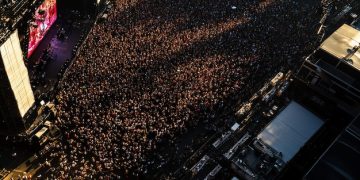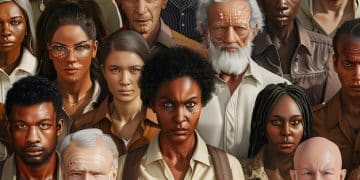The Role of Music Festivals in American Cultural Identity
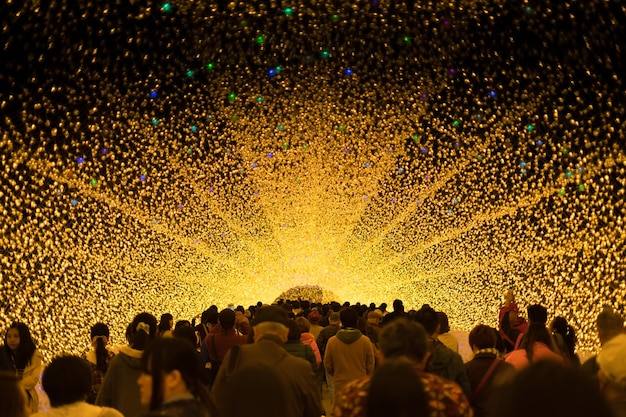
Music festivals play a significant role in defining contemporary American culture by providing a platform for artistic expression, fostering community, and reflecting evolving social values.
The role of music festivals in defining contemporary American culture is multifaceted, influencing everything from fashion trends to social movements. These gatherings serve as a cultural melting pot, bringing together diverse groups of people to celebrate music, art, and community.
Understanding the Historical Context of Music Festivals
Music festivals have a rich history in the United States, evolving from small folk gatherings to massive events that draw hundreds of thousands of attendees. Understanding this evolution is crucial to appreciating their contemporary cultural impact.
Early Influences and the Newport Folk Festival
The roots of American music festivals can be traced back to the mid-20th century, with events like the Newport Folk Festival playing a pivotal role. These early festivals emphasized traditional music and fostered a sense of community among attendees.
The Rise of Rock and the Monterey Pop Festival
The Monterey Pop Festival in 1967 marked a turning point, showcasing rock and roll to a massive audience and setting the stage for future large-scale music events. It encapsulated the spirit of the counterculture movement and its rejection of societal norms.
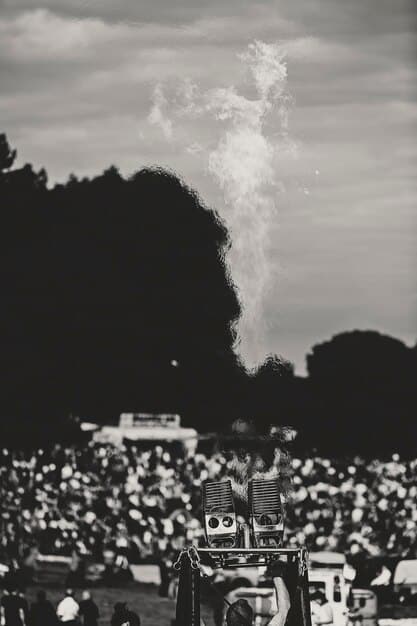
- The Newport Folk Festival established the foundation for community-driven music events.
- Monterey Pop Festival legitimized rock music within the festival circuit.
- Woodstock symbolized the apex of the counterculture movement and its connection to large-scale music gatherings.
These historical milestones demonstrate how music festivals began as niche gatherings celebrating specific genres or social movements, gradually evolving into mainstream cultural phenomena that reflect and shape contemporary American values.
Music Festivals as Economic Engines
Beyond their cultural impact, music festivals have a significant economic impact on local communities and the broader economy. They generate revenue through ticket sales, accommodations, and local spending.
Direct Economic Impact on Host Cities
Host cities benefit directly from music festivals through increased tourism, hotel occupancy, and spending at local businesses. These events bring an influx of visitors who contribute significantly to the local economy.
Job Creation and Employment Opportunities
Music festivals create numerous job opportunities, ranging from security personnel and vendors to stagehands and hospitality staff. These temporary and seasonal jobs provide income for many individuals and contribute to the overall economic health of the region.
Music festivals also indirectly support related industries such as transportation, catering, and event production, further amplifying their economic footprint.
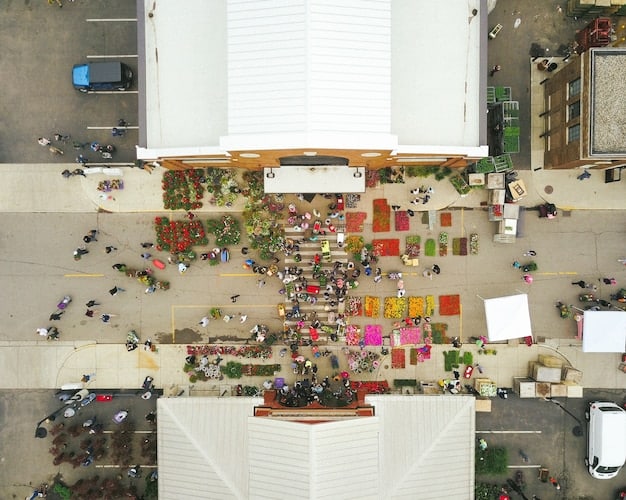
The Festival Market: Tickets, Merchandise, and Sponsorships
Revenue streams for festivals extend beyond ticket sales. Festivals generate revenue through merchandise sales and sponsorship deals, both integral for offsetting costs.
- Ticketing accounts for major revenue, often tiered for different experiences.
- Merchandise like clothing and accessories provides additional income.
- Sponsorships from brands fund portions of the event and broaden its exposure.
The economic impact of these festivals is substantial, but communities must also weigh the costs and environmental impact to balance economic gains with environmental and community needs.
The Role of Music Festivals in Promoting Social Values
Music festivals are not merely entertainment events; they also serve as platforms for promoting social values and raising awareness about important issues. They provide a space for dialogue, activism, and community engagement.
Activism and Social Awareness Campaigns
Many festivals incorporate activism and social awareness campaigns into their programming, addressing issues such as environmental sustainability, social justice, and mental health awareness. These initiatives encourage attendees to get involved and make a positive impact.
Diversity and Inclusion Initiatives
Festivals increasingly prioritize diversity and inclusion, booking artists from diverse backgrounds and implementing policies to ensure a safe and welcoming environment for all attendees. This commitment to inclusivity reflects a broader societal push for equality and representation.
Community Building and Social Cohesion
Music festivals foster a sense of community and social cohesion by bringing people together from diverse backgrounds to share a common experience. These events provide opportunities for attendees to connect with one another and build lasting relationships.
By promoting these values, music festivals contribute to a more inclusive and socially conscious society.
Fashion, Trends, and Festival Aesthetics
Music festivals have a significant impact on fashion trends and aesthetics, influencing everything from clothing styles and accessories to hairstyles and makeup. These events serve as a showcase for emerging trends and individual expression.
Bohemian and Festival-Inspired Fashion
Bohemian-inspired fashion has long been associated with music festivals, characterized by flowing dresses, fringe, and earthy tones. This style reflects a sense of freedom and individuality, resonating with the spirit of the festival experience.
The Influence of Street Style and Emerging Trends
Street style plays a significant role in shaping festival fashion, with attendees showcasing their personal style and experimenting with new trends. These looks often incorporate elements of streetwear, vintage clothing, and DIY designs.
Impact on Retail and Market Trends
The fashion trends seen at music festivals often trickle down into mainstream retail, influencing consumer preferences and driving sales. Retailers pay close attention to festival fashion to anticipate upcoming trends and cater to the demand for festival-inspired clothing and accessories.
Festival fashion is not just about aesthetics; it is also a form of cultural expression and identity, allowing individuals to showcase their values and affiliations.
The Evolution of Musical Genres Represented at Festivals
The genres represented at music festivals have evolved drastically over the years, reflecting changing tastes and cultural shifts. From folk and rock to electronic and hip-hop, the musical landscape of these events has adapted to embrace a wide range of sounds.
From Folk and Rock to Electronic and Hip-Hop
Early music festivals primarily featured folk and rock music, reflecting the dominant genres of the time. However, as musical tastes evolved, festivals began to incorporate electronic music, hip-hop, and other genres, catering to a broader audience.
The Rise of Niche and Genre-Specific Festivals
In addition to large-scale multi-genre festivals, niche and genre-specific festivals have emerged, catering to specific musical tastes and communities. These events provide a more intimate and focused experience for attendees.
How Festivals Introduce New Music and Artists To Mainstream Audiences
Festivals offer both emerging and established artists visibility to broad audiences, sometimes catapulting careers.
- Festivals serve as crucial points for music discovery.
- Main stages boost artists’ visibility, introducing them to new fanbases.
- Niche stages help smaller acts reach dedicated music fans.
This exposure is invaluable, especially in a saturated market, and helps artists build credibility and gain industry recognition.
The Future of Music Festivals in America
The future of music festivals in America is likely to be shaped by several factors, including technological advancements, changing consumer preferences, and environmental concerns. These influences will drive innovation and adaptation within the industry.
Technological Advancements and Innovation
Technology is playing an increasingly important role in music festivals, from ticketing and cashless payments to immersive experiences and virtual reality. These advancements enhance the attendee experience and create new opportunities for engagement.
Sustainability and Environmental Responsibility
Environmental concerns are driving a push for greater sustainability and responsibility within the festival industry. Festivals are implementing initiatives to reduce waste, conserve energy, and minimize their environmental impact.
The Impact of Streaming Services, Digital Music, and Social Media
Streaming services, digital music, and social media have transformed the music industry and influenced the way people discover and consume music. These platforms play a significant role in shaping festival lineups and promoting events to a global audience.
These elements are set to change the very nature of performance and experiences, creating festivals more aligned with the new consumer.
| Key Aspect | Brief Description |
|---|---|
| 🎵 Cultural Mirror | Festivals reflect and influence cultural values. |
| 💰 Economic Boost | They significantly impact local economies. |
| 🎤 Social Platform | They promote social values and awareness. |
| 👗 Fashion Driver | They heavily influence fashion trends each year. |
Frequently Asked Questions
Music festivals serve as a showcase for emerging fashion trends, influencing clothing styles, accessories, and overall aesthetics. Attendees often express their individuality, leading to diverse and experimental looks that trickle down into mainstream retail.
Music festivals bring significant economic benefits to host communities through increased tourism, hotel occupancy, and spending at local businesses. They also create job opportunities and support related industries, such as transportation, catering, and event production.
Many festivals incorporate activism and social awareness campaigns into their programming, addressing issues such as environmental sustainability, social justice, and mental health. They also prioritize diversity and inclusion, creating safe spaces for all attendees.
Early music festivals primarily featured folk and rock music. Over time, festivals have embraced a wider range of genres, including electronic music, hip-hop, and niche subgenres. This evolution reflects changing musical tastes and the growing diversity of festival audiences.
The future of music festivals will likely be shaped by technological advancements, a focus on sustainability, and changing consumer preferences. Expect more immersive experiences, eco-friendly initiatives, and a greater integration of digital music platforms and social media.
Conclusion
In conclusion, the role of music festivals in defining contemporary American culture is undeniable. They serve as economic engines, hubs for social activism, and trendsetting platforms, shaping the cultural landscape in profound ways. As they continue to evolve, they are set to reflect and influence American identity for years to come.
